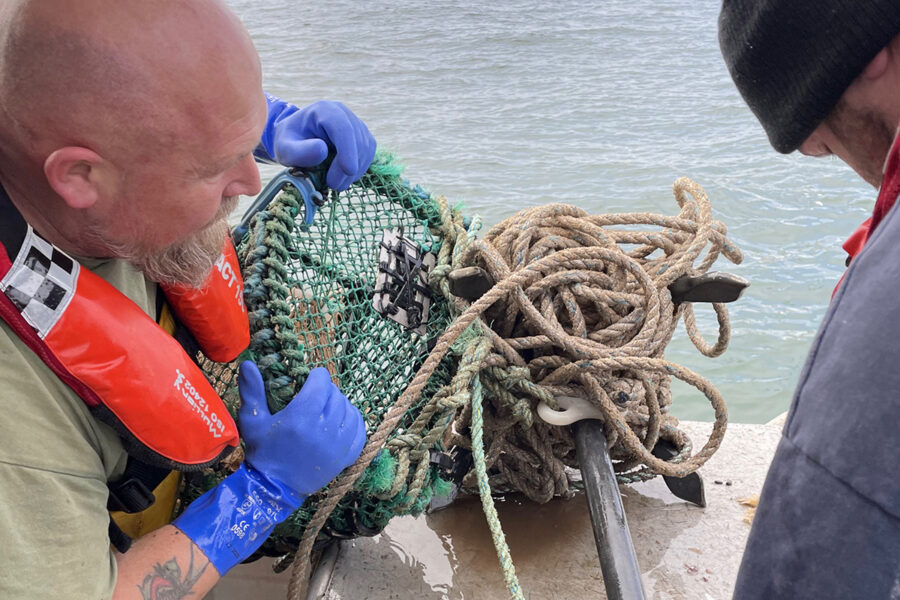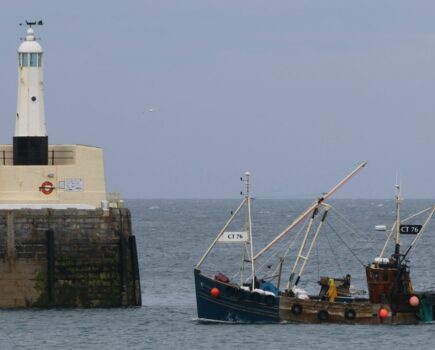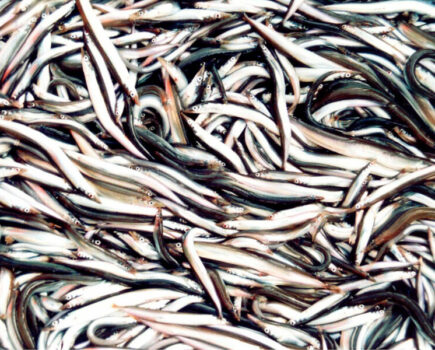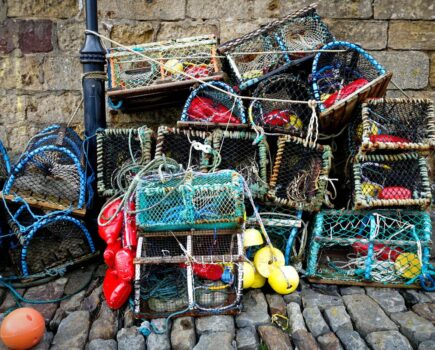UK fisheries minister Mark Spencer faced a wide-ranging series of questions when he faced MPs in a Scottish Affairs Committee meeting last week, reports Andy Read.
Intended to mainly discuss the impacts of spatial squeeze in Scottish waters, the question and answer session also discussed wider issues relating to the ongoing coastal states negotiations on shared pelagic stocks, and the continuing issues faced in recruiting foreign crew to the fleet.
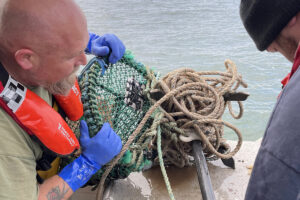
It seems that this sight will never be seen in HPMAs! Static-gear vessels and wind farms may find a way to co-exist elsewhere, but both seem set to be excluded from the HPMA network, exacerbating spatial squeeze elsewhere.
However, with the Scottish government undertaking its own public consultation on HPMAs in Scottish waters, with apparently a very different vision about their implementation than that of the UK administration, the scene seems set for a confrontation between the UK and Scottish governments over who will make decisions on both the designation of Scottish HPMAs and what will be allowed to happen within them.
With the Scottish government committed to designate 10% of Scottish waters as HPMAs, but yet to decide what will be permitted within them, the UK minister confirmed that all fishing will be banned in HPMAs. The implications for fishermen in English waters, with just 0.53% of the English EEZ expected to be designated, will be very different than for those in Scotland.
The minister confirmed to the committee that beyond 12 miles in Scottish waters, decisions on designations would not be devolved to the Scottish government.
He refused to confirm whether or not wind farms would be banned from HPMAs, but appeared to suggest that they would be – a decision that could also have profound implications for the fishing industry in Scottish waters if implemented there.
In Scotland, the consultation on HPMAs remains open until 20 March. The Scottish government has made a clear commitment to designate 10% of the Scottish sea area as HPMAs, and place ‘strict limits on human activities such as fishing and aquaculture’, but has not mentioned wind power, or a complete ban on fishing activities.
Formal designation of the English HPMAs, the most controversial one being off Lindisfarne in Northumbria, is expected to be completed by July of this year.
Mairi Gougeon, the Scottish cabinet secretary for rural affairs, also received a request to be interviewed by the committee, but declined to attend. Fishing News contacted her office for comment, but had received no reply as we went to press.
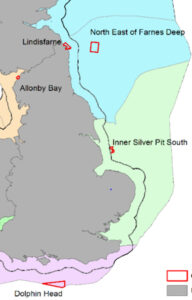
The five candidates for English HPMAs, which cover just 0.53% of English waters, and where all fishing activity is likely to be prohibited. The Scottish government has a target of designating 10% of Scottish waters – which comprise over 60% of the UK EEZ – as HPMAs. (Map: JNCC)
Commenting on the designation in Scottish waters, Mark Spencer told MPs: “Beyond 12 miles, this is best done under the UK umbrella. Designation beyond 12 miles will impact on foreign fleets, and as such should be a UK matter. The Defra minister responsible, Richard Benyon, is meeting shortly with his Scottish counterpart to discuss this.”
At the committee meeting, it was clear that efforts by the fishing industry to raise awareness amongst MPs of the threat posed by spatial squeeze had been successful. The impact of large wind farms that will be inaccessible to many offshore fishing vessels and the banning of fishing activities within HPMAs were raised as issues by a number of MPs across the political spectrum.
Several MPs referenced the joint SFF/NFFO report on spatial squeeze that was presented to MPs last year. Philippa Whitford, SNP MP for Central Ayrshire, asked for direct evidence that ‘spillover’ from HPMAs would actually benefit the industry – as opposed to general evidence from elsewhere in the world. David Duguid, the Conservative member for Banff and Buchan, echoed concerns raised by the SFF about whether sufficient evidence was in place to justify a blanket ban on fishing within HPMAs.
Addressing these concerns, Mark Spencer told MPs that spatial squeeze affected all northern European fishing fleets, but rejected the contention that there was insufficient evidence to designate HPMAs. He argued that there was room for both the offshore energy sector and fishing to coexist and flourish into the future, and that both industries were vitally important.
Confirming Defra’s expectation that all extractive activity, including all types of fishing, would be banned in HPMAs sited in English waters, the minister told MPs: “HPMAs will be areas that allow biodiversity to flourish. They also provide an opportunity to generate fish stocks for future generations. I want to see a successful fishing industry flourishing in 50 years’ time, but it will be one that allows marine protection and safeguards breeding populations.”
SFF: ‘No justifiable scientific rationale’
Commenting on the session with the minister, and the issues between the Holyrood and Westminster governments, SFF chief executive Elspeth Macdonald told Fishing News: “It was disappointing that cabinet secretary Mairi Gougeon chose not to attend the meeting of the Scottish Affairs Committee to discuss her policies with MPs representing Scottish constituencies, including several with fishing interests.
“The Scottish government’s proposals on Highly Protected Marine Areas are a huge concern for our sector, irrespective of where the powers sit to designate them. There is no justifiable scientific rationale for their introduction, or any evidence whatsoever that they will achieve their very vague aims.
“MPAs aim to strike a balance between conservation and sustainable harvesting, whereas HPMAs will exclude fishing altogether. HPMAs will also exclude most other types of activity, resulting in even greater pressure for marine space in other areas.
“The fishing industry is supportive of well-evidenced conservation measures, and indeed has been an active and constructive partner in developing the MPA network, but it is vitally important that we understand what we are conserving and why, and how we assess the contribution of restrictions to the objectives in question.
“The HPMA process in Scotland is prioritising political objectives over good policy- making and decision-taking.
“We welcome the Westminster committee looking into these vital issues, and we hope that Holyrood will follow suit, not least as so many of the responsibilities lie north with the Scottish government.”
Have your say!
Marine Scotland is running a series of online sessions this week and next to support responses to the consultation on HPMAs. You can register to participate in one of these sessions at: bit.ly/3Ykln15
The sessions are scheduled to take place on:
Monday, 13 February: 10am, Wednesday, 15 February: 5pm Friday, 17 February: 2pm Saturday, 18 February: 10am Tuesday, 21 February: 5pm Wednesday, 22 February: 5pm
Full details of the consultation, and an online response form, are also available on the Scottish government website.
This story was taken from the latest issue of Fishing News. For more up-to-date and in-depth reports on the UK and Irish commercial fishing sector, subscribe to Fishing News here or buy the latest single issue for just £3.30 here. Read our editor’s comment about this here.

